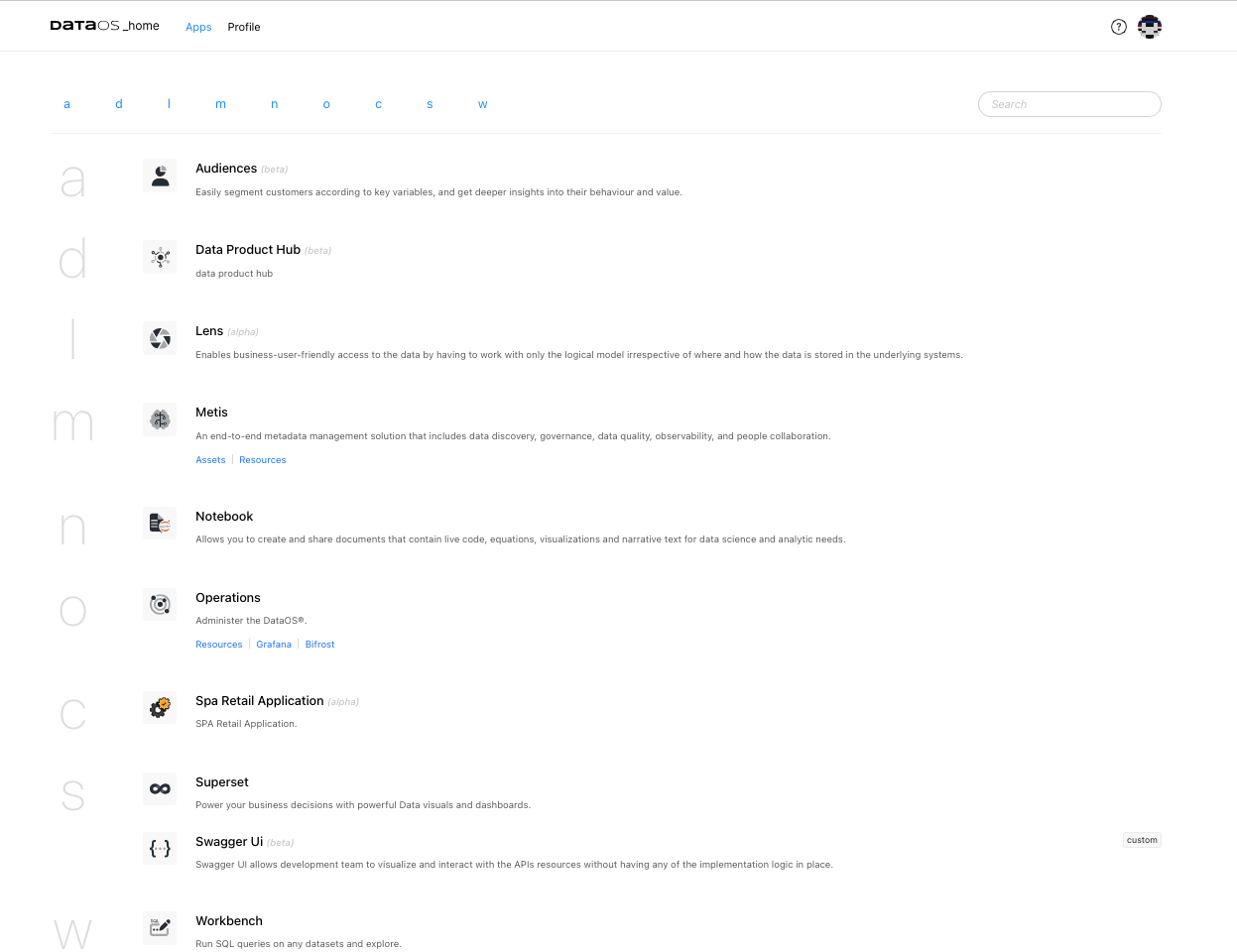Getting Started with DataOS¶
Welcome to DataOS!
DataOS enables you to build, manage, and share data products that drive significant business outcomes. This guide provides a structured approach to familiarizing yourself with DataOS capabilities according to your role and responsibilities within your organization.
Initial Account Setup and Access to the DataOS Instance¶
Contact the DataOS administrator or your organization's administrator for sign-in details and the appropriate access level according to your role in the organization.
Navigating DataOS¶
Depending on your persona, discover the diverse ways to interact with your DataOS instance and begin your journey. The simplest method is to enter the DataOS URL in your browser and sign in, navigating you to the DataOS homepage.

Key Personas of DataOS¶
Before you proceed, it is crucial to understand how DataOS benefits various user personas with different responsibilities. By familiarizing yourself with these key personas and their interactions with DataOS, you can effectively harness the platform's capabilities to drive data-informed decisions and achieve operational efficiency.
Data Product Consumer¶
Data Product Consumers in DataOS encompass a variety of roles, such as Data Analysts, Business Analysts, and Data Scientists. Analysts play essential roles in leveraging data for actionable insights and strategic decision-making. They utilize DataOS to discover, explore, and activate data products, enabling them to transform raw data into valuable business intelligence and drive innovation. Data Scientists leverage advanced analytical techniques and machine learning algorithms to extract meaningful insights from data within DataOS.
Here are the key responsibilities of a Data Product Consumer, though specific tasks may vary depending on the role or initiative:
Key Responsibilities¶
-
Discovering and Accessing Data Products: Identify and access relevant data products based on business needs. Interpret metadata to understand product details and assess the usability of data products for informed decision-making.
-
Navigating Semantic Models: Understand the relationships between data entities within semantic models to improve data comprehension.
-
Checking Data Quality: Evaluate data products for accuracy, consistency, and completeness, ensuring high-quality analysis and decision-making.
-
Understanding Governance and Policies: Ensure data usage and access aligns with organizational security standards and regulations.
-
Activating Data Products: Consider how data products can be consumed with Business Intelligence (BI) tools, APIs, and other applications to enhance workflows and reporting.
-
Tracking Metrics and Performance: Monitor performance, usage, and impact metrics of data products to assess their effectiveness and communicate results to stakeholders.
If you are a Data Product Consumer, click here to begin your DataOS journey.
Data Product Developer¶
Data Product Developers play a key role in creating, managing, and evolving data products within DataOS. They are responsible for building the data infrastructure that powers everything from analytics to business intelligence, making sure data flows smoothly through pipelines and stays accurate and accessible for users. Plus, they ensure those data products deliver reliable insights while staying in line with governance policies.
Key Responsibilities¶
Here are the key responsibilities of a Data Product Developer, though specific tasks may differ based on the role or objective:
-
Collaborate with stakeholders: Collaborate with stakeholders to gather requirements, align data products with business objectives.,
-
Design Data Products: Design semantic models, define quality and security standards, and determine how users will consume the data product.
-
Data Pipeline Management: Create data pipelines, implement data transformations to efficiently handle data ingestion.
-
Quality Assurance: Ensure data integrity through quality checks and monitoring.
-
Data Governance and Security: Apply appropriate data security, access controls, ensuring regulatory compliance.
-
deployment and Maintenance: Deploy data products efficiently, monitor their performance, and manage updates using CI/CD practices.
If you are a Data Product Developer, click here to begin your DataOS journey.
Data Product Owner¶
Data Product Owners oversee the lifecycle of data products within DataOS. They ensure data quality and compliance with regulatory requirements, manage data integrity and security, and govern data distribution.
DataOS Operator¶
A DataOS Operator is the administrator responsible for managing and maintaining the DataOS platform. This role involves overseeing the system’s performance, ensuring the secure management of resources, and guaranteeing compliance with regulatory standards. The operator is the key figure who ensures the platform’s day-to-day operations run smoothly, providing a stable environment for all teams interacting with DataOS.
The DataOS Operator handles a range of tasks, from provisioning compute resources to managing access controls and system security. They are also responsible for monitoring system health, ensuring interoperability with external systems, and scaling the platform to meet growing demands. In essence, the DataOS Operator ensures the platform’s integrity and performance, allowing teams to leverage data efficiently while safeguarding critical assets.
Key Responsibilities¶
A DataOS Operator could be an existing Forward Deployment Engineer, DevOps Engineer, or a Cloud Engineer. Here are the key responsibilities of a DataOS Operator:
-
Kubernetes Cluster Management: Oversee and manage Kubernetes clusters to ensure the optimal performance of the DataOS platform.
-
Cloud Infrastructure Management: Handle deployments and resource management on cloud platforms like AWS, GCP, or Azure.
-
System Monitoring: Use tools like Prometheus and Grafana to monitor system health, track performance metrics, and resolve issues proactively.
-
Access Control Management: Manage authentication and authorization mechanisms to enforce data governance and ensure appropriate access to resources.
-
Container Management: Manage Docker containers to ensure smooth operation within DataOS' containerized environment.
-
Minerva Cluster Management: Optimize and manage Minerva Clusters to handle query processing and ensure efficient resource use.
-
Credential and Secret Management: Securely manage sensitive information, including credentials and secrets, to maintain system integrity.
-
Compute Resource Provisioning and Scaling: Provision and scale compute instances based on the platform’s needs, ensuring sufficient resources for workflows, jobs, and queries.
-
Regulatory Compliance: Ensure that all platform operations comply with relevant regulatory standards for security and data management.
-
System Security: Maintain the security of the DataOS platform, implementing best practices for resource and data protection.
If you are a DataOS Operator, click here to begin your DataOS journey.